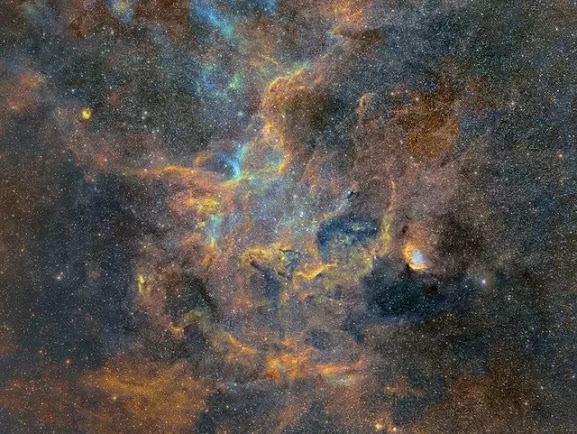Finnish astrophotographer, JP Metsavainio, took on the daunting task of creating a mosaic of the Milky Way back in 2009. It took him twelve years to get the whole picture which is around 100,000 pixels wide and has 234 individual mosaic panels stitched together.
Not only did he manage to capture the entire galaxy but also 20 million stars within the Milky Way. You can check out the entire picture in its full resolution here.
"The reason for a long time period is naturally the size of the mosaic and the fact that the image is very deep. Another reason is that I have shot most of the mosaic frames as individual compositions and published them as independent artworks.," Metsavainio wrote on his blog.
While Metsavainio is an astrophotographer by profession, this project was a pet project. All of the mosaic work was done on Photoshop. “I think this is the first image ever showing the Milky Way in this resolution and depth at all three color channels,” he told PetaPixel.
Here's an in-depth look at the image of the Milky Way that took over 1,000 hours and 12 years to collate:
This is the full image of the Milky Way by Metsavainio
This is the part of the sky that Metsavainio capture in his mosaic
The California Nebula
The California Nebula, also called NGC 1499, was discovered by EE Barnard in 1884. On the large mosaic image, it can be seen at the bottom left corner.
The nebula is located around 1,000 light years from Earth. Because of its low surface brightness, it is one of the most difficult astronomical objects to observe.
From the Bubble to the Cave
The Bubble Nebula, around 11,000 light years from Earth, can be seen as a tiny pearl-like formation in the middle left. Near the Bubble lies much larger Sharpless 157, which is the bright area at lower left.
The Cave Nebula, which is relatively close at only 2,400 light years from Earth, is located on the upper right area of the photo.
Cygnus Constellation
Cygnus is one of the most recognizable constellations in the sky. It contains one of the brightest stars in the night sky called Deneb.
“Constellation Cygnus is an endless source of celestial wonders, both scientifically and aesthetically,” said Metsavanio. “For me, as a visual artist, this area of night sky is very inspiring. There are endless amounts of amazing shapes and structures, I can spend the rest of my life just shooting images from this treasury.”
The Tulip Nebula
Within the Cygnus constellation, resides the Tulip Nebula. The object is also located next to the black hole, or microquasar, called Cygnus X-1.
In the bigger mosaic, the Tulip Nebula can be spotted at the center right.
“My current toolset is very suitable for this kind of objects, since it is kind of heavily undersampled and that's good when I need to capture very dim and large objects,” Metsavanio said in October 2020.
The Elephant’s Trunk
The Elephant's Trunk Nebula is a concentration of interstellar gas and dust within the much larger ionized gas region IC 1396, seen in the image above.








